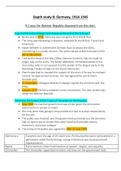Depth study B: Germany, 1918-1945
9.1 was the Weimer Republic doomed from the start.
How did Germany emerge from defeat at the end of the first war?
• By the end of 1918, Germany was losing the First World War.
• The army was retreating in disorder, attacked by the British, French and
Americans.
• Kaiser Wilhelm II, ordered the German Navy to attack the Allies,
considering it a suicide mission. The sailors based at Kiel mutinied on the
9th of November.
• Told by the head of the War Office, General Groener, that he could no
longer rely on the army. The Kaiser abdicated. He handed power to his
chancellor, who in turn passed it to the leader of the largest party in the
Reichstag. Frederick Ebert of the Social Democrats.
• Ebert knew that he needed the support of the army if he was to maintain
control, he approached Groener, the two agreed the secret Ebert
Groaner pact.
• 11 November colleague Mathias Erzberger signed the armistice with the
Allies.
• January 1919 Germany adopted a new constitution. The new system was
called the Weimer Republic.
What was the impact of the Treaty of Versailles on the Republic
• May 1919 the German government was simply given the provisional
peace terms to accept or reject.
• Not only were they going to be punished but had to accept responsibility
for the war.
• The public was shocked, and the government protested but the Germans
had no option but to accept they were faced with possible mutiny,
revolution, economic collapse.
• The treaty of Versailles was signed the 28th of June 1919.
Democracy. Everyone over the age of 20 could vote. Political parties were represented in a
parliament called the Reichstag. voting in elections was by proportional
representation.
Rights Every German citizen had freedom of speech, religion, and equality.
Chancellor. The chancellor appointed ministers and they ran the government daily.
, Presidents. The president was the head of State, head of the Army and protector of the
Constitution. They could appoint and dismiss the chancellor.
In a crisis, the president could allow the Chancellor to use Article 48 to pass an
emergency decree.
Regions. Germany was made-up of 17 individual states called Länder
Justice. The president appointed judges, anyone who tried to overthrow the new
system could be charged with treason.
1. Soldiers felt that the army had been betrayed by corrupt politicians. In
October and November 1918. They had not actually lost the war on the
battlefield and were still in France when the Armistice was signed. Known
as the stab in the back.
2. The Politian’s who signed the armistice were labelled the November
criminals
3. Versailles was referred as a ‘Diktat’
4. The league of nations was called the ‘League of Victors’ as it was believed
to keep Germany weak
Left wing political developments
• January 1919 the Spartacist party, led by Rosa Luxemburg and Karl
Liebknecht, seized government buildings in a bid for power.
• President Ebert called on the army and the Freikorps to help crush the
uprising. They were arrested by the police. Both were both were violently
beaten and shot.
• The first attempt at a communist revolution failed, and the Ebert-
Groener pact had passed its first loyalty taste.
• February 1919, the leader of Bavaria Kurt Eisner was killed. Communists
seized power. In March Ebert again turned to the army. By May 1990,
order had been restored.
• The third attempt at a communist uprising was made in 1920 in the Ruhr
Valley.
Right wing political developments.
• The Freikorps supported the government in 1918 and 1919 because
many former soldiers hated communists and blame them for the 1918
defeats.
• One Freikorps leader, general Lüttwitz refused and joined forces with the
leader of the Patriotic Fatherland Party, Wolfgang Kapp.
• This time the Ebert-Groener Pact failed. The army refused to fire. Kapp
was made chancellor of a new militaristic government




